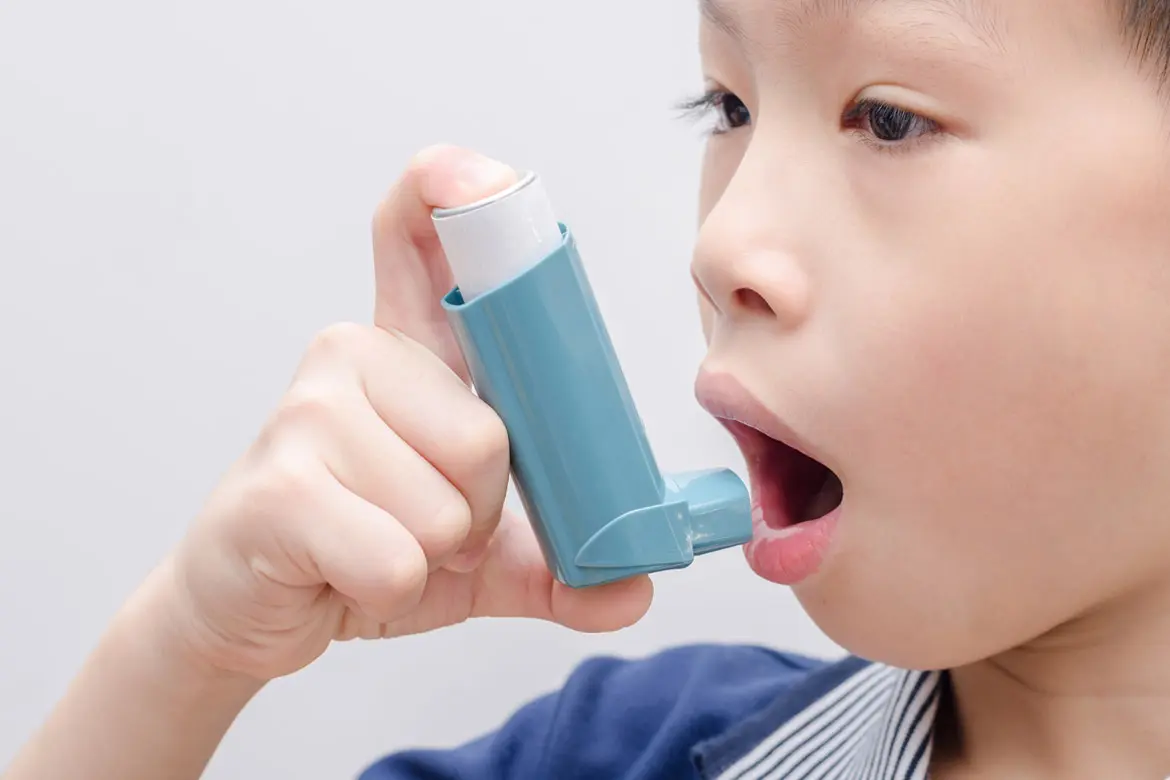Asthma occurs when the airways (bronchial tubes) in the lungs become inflamed and are blocked by mucus, making breathing difficult. The chest tightens and the lungs seem to produce a wheezing sound.
Signs and symptoms of an asthma attack
The presence of these 4 symptoms could indicate that a person has asthma:
- Coughing that won't stop. This may be present during the day or it may wake you up at night
- Wheezing or a whistling sound when breathing. It is heard more when you breathe out. It can start as a low-sounding whistle and get higher
- Breathing problems such as shortness of breath, difficulty in breathing out, or very rapid breathing
- Chest tightness or pressure
Other warning signs suggestive of an asthma attack (also called an exacerbation) are:
- Difficulty talking
- Feelings of anxiety or panic
- Pale, sweaty face
- Blue lips or fingernails
- Worsening of symptoms despite use of medications
Asthma can be well controlled. If you find that you're experiencing asthma attacks often, consult your doctor on the lifestyle changes you can make to prevent the attacks. Here are 7 steps endorsed by Dr Ong Kian Chung, respiratory specialist at Mount Elizabeth Hospital, on how to keep your condition under control.
1. Identify asthma triggers and symptoms
In order to prevent an asthma attack, it is important you first recognise the causes of it. Certain triggers can set off a cascade of asthma symptoms – coughing, wheezing, difficulty breathing – so it's important you identify the triggers. That way, you can take steps to avoid an asthma attack.
If you don't already know what's causing your asthma attacks, start keeping track of your asthma symptoms in a diary.
Monitor for several weeks and remember to include all the environmental and emotional factors that are associated with your asthma. When you experience an asthma attack, return to your diary to see which (combination of) factors might have contributed to it. Some common asthma triggers are not always obvious.
Once you've identified your asthma triggers, it will be easier to look into ways you can avoid them. The most common asthma triggers include air pollution, allergies, the flu virus, and smoke.
2. Devise an asthma action plan with your doctor
Developing an asthma action plan with your doctor can help you control your asthma. The plan should document important information, such as your medications, how to handle asthma attacks, and how to control your asthma symptoms in the long run. Most plans separate asthma symptoms into 3 coloured zones – green, yellow and red – to help you monitor the severity of your symptoms.
Asthma is an ongoing condition that requires regular monitoring and treatment. Taking control of your treatment can make you feel more in control of your condition, and life in general.
3. Allergy-proof your environment to avoid an asthma attack
If you have allergy-induced asthma, be sure to minimise your exposure to substances you are allergic to. Allergen exposure can temporarily increase the inflammation of the airways in a person with asthma, making them more susceptible to an asthma attack. The easiest way to reduce exposure to allergens is to rid them completely or at least allergy-proof your environment. Some of the ways to allergy-proof your environment include:
- Change the bed linen regularly and wash your bedsheets and pillow covers in hot water to rid it of dust mites
- Install an air purifier (with a certified HEPA filter) in the bedroom to reduce the quantity of dust mites
- Use a dehumidifier to reduce moisture and prevent mould from forming in your home
- Vacuum your floor with a suction cleaner containing a HEPA filter at least twice a week to avoid the accumulation of dust
4. Avoid smoking areas
Smoke and asthma are a bad mix. Inhaling smoke – even secondhand smoke – can trigger an asthma attack and block your airways. Be sure to avoid all sources of smoke, including tobacco, incense, candles and fire, wherever possible. You may wish to follow some of these tips:
- Do not allow smoking in your home or car
- Avoid smoking zones in public areas, eg. at the coffee shop
- When travelling, opt for a no-smoking room
5. Get vaccinated for flu
Get a flu shot every year to protect against the flu virus, which almost always makes asthma much worse for days to weeks. People with asthma are more likely to have complications from the flu, such as pneumonia, and are more likely to be hospitalised as a result. Staying current with vaccinations can prevent flu and chest infections which may trigger asthma flare-ups.
6. Exercise safely with asthma
Physical activity is important for overall health, even for those with asthma. One of the goals of asthma treatment is to help you maintain a normal and healthy lifestyle, which includes exercise and other physical activities. Swimming, for example, is generally well-tolerated by many people with asthma because it is usually performed while breathing warm, moist air. It is also an excellent activity for maintaining physical fitness.
Ultimately, do discuss with your doctor to devise an appropriate workout routine that's safe for you to follow through so that you can continue to keep fit.
7. Keep asthma under control with medications
It always pays to be prepared. Apart from keeping your asthma under control by taking your medication as prescribed, you can also bring quick-relief asthma medication wherever you go. If you're heading out, be sure to bring your asthma relief medication along and find out beforehand the location of the nearest hospital so that you know where to head to in an emergency.
Several types of medications are available to prevent and treat asthma symptoms:
- Long-term asthma control medications are the most important treatment for most people with asthma. They are taken regularly to control chronic symptoms and prevent asthma attacks. Examples include inhaled corticosteroids and leukotriene modifiers.
- Quick-relief (rescue) medications are used to prevent or treat an asthma attack. They are taken as needed for rapid, short-term relief of symptoms. Examples include short-acting beta agonists, ipratropium, and oral and intravenous corticosteroids.
- Medications for allergy-induced asthma are taken regularly or as needed to reduce the body's sensitivity to a particular allergen. These include allergy injections and medications.
- Biologics are used to better manage severe asthma symptoms. They are taken with control medications to stop underlying biological responses causing inflammation in the lungs.
Always speak to a doctor before starting any medications.
Asthma attacks are essentially signs that your asthma is not well-controlled. If you find that you're experiencing asthma attacks once too often, consult your doctor on the lifestyle changes you can make to regain control of your condition.












